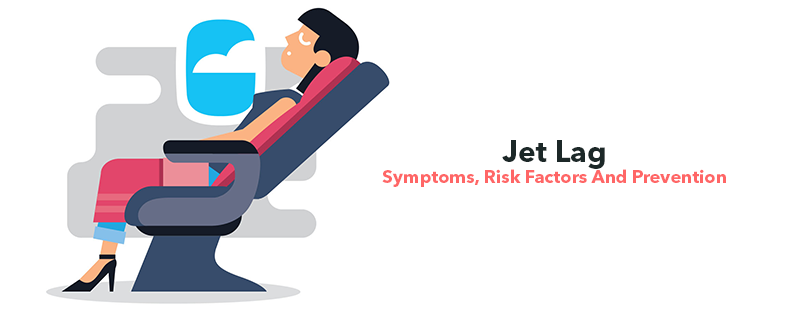Jet Lag- Symptoms, Risk Factors and Prevention
Jet lag can happen when the patterns of sleep-wake are disrupted. A person may feel somnolent, tired, irritable, lethargic and somewhat disoriented.
This may be the result of going across time zones or performing shift work.
The more time zones a person crosses in a short period, the more serious the symptoms can be.
Jet lag is associated with interruption of activity and a lack of synchronization between two areas of the brain in the brain cells.
The older a person becomes, the more serious their symptoms usually become, and the longer it takes to get back into sync with their body clock.
Children usually experience milder symptoms, and recover more quickly.
Symptoms
Symptoms of jet lag can vary. You may have only one or you may have multiple symptoms. Symptoms of jet lag may include:
- Sleep disturbed — for example insomnia, early waking or excessive sleepiness
- Daytime fatigue
- Hard in Focus or work issues at the usual level
- Stomach problems, constipation or diarrhea
- A general feeling of not being well
- Mood changes
Symptoms worse the farther you travel
Jet lag symptoms typically occur within one or two days of travel if you’ve traveled through two time zones or more. The more time zones you have crossed, particularly if you travel in an easterly direction, the symptoms are likely to be worse or last longer. Recovering for every time zone crossed normally takes about a day.
When to call a doctor
Jet lag is temporary. But if you’re a regular traveler and are always dealing with jet lag, you might profit from seeing a sleep expert.
Causes
The cause of the jet lag is a traveler’s body’s inability to adjust instantly to the time in another country. Thus, at midnight Paris time when a New Yorker arrives in Paris, his or her body continues to work on New York time. When the body struggles to cope with the new routine, it can result in temporary insomnia, exhaustion, irritability, and diminished focus. The adjusted bathroom schedule may cause constipation or diarrhea, and when it tries to juggle schedules, the brain can become confused and disoriented.
Risk factors
The main cause of the jet lag is travel in various time zones. However, there are certain risk factors which can lead to more severe or longer-lasting symptoms.
- Travel across three or more time zones: Most people can fastly adjust to a one or two time zone change. Four or more signs of jet lag can be more noticeable.
- Flying east: As previously mentioned, traveling from west to east causes travelers to “lose” time and this can be more difficult to adjust.
- Age: older adults can recover more slowly from jet lag.
- Frequent travel: Pilots, flight attendants and regular business travelers who are frequently in various time zones can difficult to adjust.
- Preexisting conditions: Preexisting deprivation of sleep, stress and poor sleeping habits may exacerbate symptoms of jet lag.
- Flight conditions: travel, immobility and cramped seating, airline food, altitude and cabin pressure’s monotony can affect the symptoms of a jet lag.
- Alcohol use: alcohol overconsumption during long flights can also exacerbate the symptoms of jet lag.
Complications
In jet-lagged people, motor vehicle accidents caused by drowsy driving may have a greater chance.
Prevention
By following these tips and strategies you can help prevent or reduce the jet lag:
1. Snooze on the plane
Try to sleep on the plane if you’re traveling eastward and into a new day. Bring earplugs and eye masks to help dampen noise and light.
2. Select flight times strategically
Choose a flight that lets you arrive in early evening. This way, staying up until it’s time for bed in your new time zone isn’t as hard.
3. Power nap
If bedtime is too far away and you need a break, take no more than 20 to 30 minutes of a power nap. Sleeping longer than that will avoid a later night’s sleep.
4. Plan extra days
Take a cue from athletes, and arrive a few days early to your destination so you can acclimatize before any major event or meeting you expect to attend.
5. Anticipate the change
If you are heading to the east, try to get up several hours earlier for a couple of days before your departure. If you move toward the west, do the opposite. Stay awake later and get up later to help change before you take off.
6. Don’t hit the booze
Avoid alcohol and caffeine the day before and the day of your flight. Such drinks will mess with your natural clock and prevent sleep. In the end, they may make the jet lag symptoms worse.
